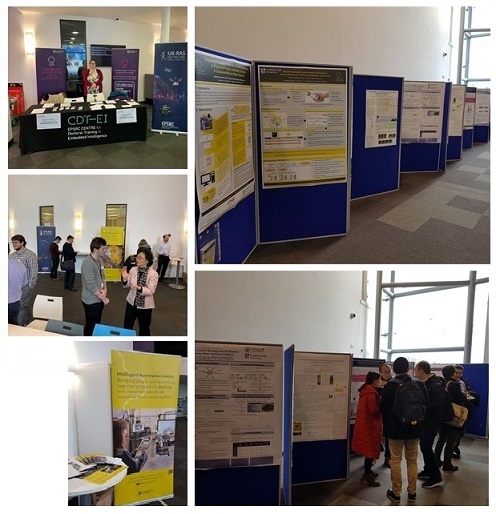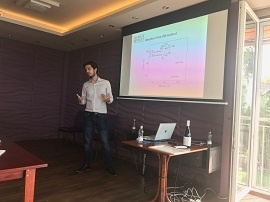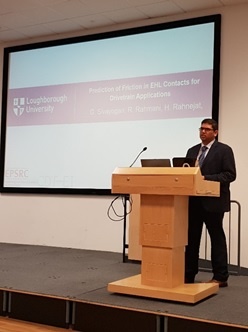The Centre for Embedded Intelligence at Loughborough university was proud to play host to the UK Robotics and Autonomous Systems (UKRAS) Network’s annual conference.
The UKRAS19 Conference on Embedded Intelligence UK took place on Thursday the 24th of January and the conference attracted over 130 delegates on the day. The programme included four plenary speakers; Dr Slava Chesnokov, Senior Technical Director, Media Imaging, ARM, “ARM computational platforms for CV/Image Processing for future Robots: NN accelerator vs. fixed NN HW”; Prof. Tom Duckett, Professor of Robotics & Autonomous Systems Director, Lincoln Centre for Autonomous Systems (L-CAS) “The Future of Robotic Agriculture”; Dr. Séverin Lemaignan, Senior Research FellowBristol Robotics Laboratory, “Robots for education: from social to non-social, a look at the challenges of tomorrow”; and Prof. Barry Lennox, Professor of Applied Control School of Electrical and Electronic Engineering, School of Electrical & Electronic Engineering /Dalton Nuclear InstituteFaculty of Science and Engineering, “Development of Robotic Systems for Nuclear Applications”.
The event was attended by many of the CDT-EI students including Hazel Carlin and Jenny Lantair from Cohort 5.
We asked Hazel Carlin to share what she felt were the highlights of the day:
One of the most interesting talks was on reading the emotions of children based on stick models. This is a first step towards robots judging the mood of their co-workers in order that the robot can vary the speed of its actions. As well as numerous interesting talks, there were also many posters on display and we also had the chance to visit the Intelligent Automation Centre in Holywell Park. The day was valuable for finding out what the current state of research is in Robotics and AI.

Jenny Lantair shared her experiences of the day:
Attending UKRAS19 at Loughborough University this year was an eye opening experience, not just through touring the amazing facilities available to robotics researchers at the university, nor hearing the oratory skills of many of the presenters, being able to craft an exciting narrative, captivating an audience, but it was the people who stole my heart at the conference this year. Such an international group of researchers, across a diverse set of disciplines, all at different stages in their careers, some like Yang Zhou who is in their first few months of a PhD and others like Prof. Barry Lennox who is world renowned for his development of robotics to assist with nuclear decommissioning. These people should have little in common, yet over the day the passion for their research, the belief that what they are doing will make the world a better place in however small a way shone through. Research from Dr Severin Lemaignan would see our children educated with the assistance of robots, Prof. Tom Duckett will ensure a future food supply whilst teams at Loughborough are not simply solving the crisis of labour in the welding industry, their robotic arms can weld better, faster providing us with safer products.
The day provided inspiration to me; to achieve more, to present there next year and to never lose that passionate belief that what we are researching today will affect all of our tomorrows.
For more information about the event please visit the UK RAS website
https://www.ukras.org/news/ukras19-conference-on-embedded-intelligence







 Cohort 3 student Gergely Hantos took part in the Cambridge Spark Applied Data Science Bootcamp.
Cohort 3 student Gergely Hantos took part in the Cambridge Spark Applied Data Science Bootcamp.
 Our Cohort 2 student, Gajarajan Sivayogan, presented at the Powertrain Modelling and Control Conference.
Our Cohort 2 student, Gajarajan Sivayogan, presented at the Powertrain Modelling and Control Conference.